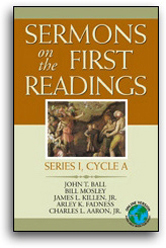SermonStudio
Ten Friends Drive Us To The Promise
Sermon
Sermons On The First Readings
Series I, Cycle A
"One day last spring, something memorable happened at Carleton University (in Ottawa, Ontario, Canada, not to be confused with Carleton College, Northfield, Minnesota). Thirty--one students in the same class turned in identical research papers. It was determined that the students had all accessed the same Internet website. If only one student had done it, the ruse might not have caught the professor's attention. But here's what else opened the instructor's eyes: the research paper's topic was 'ethics.' The unethical ethics 'research' caper suggests an opportunity.


